上海牛津英语六年级英语知识点整理一
沪教牛津版六年级英语上册全册知识点点汇总
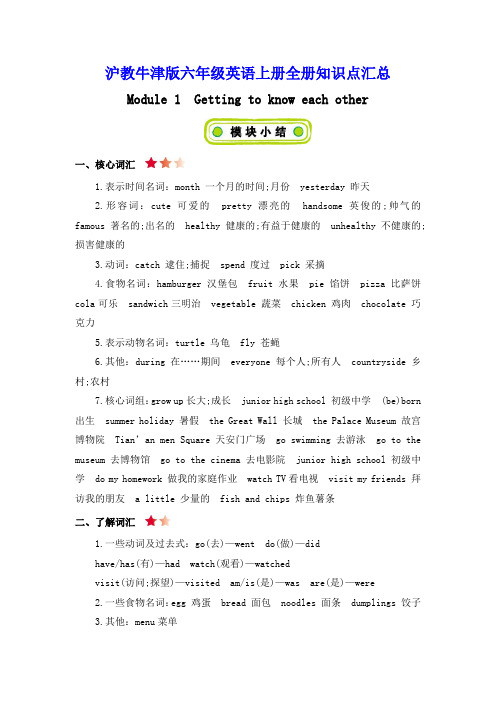
沪教牛津版六年级英语上册全册知识点汇总Module 1 Getting to know each other一、核心词汇1.表示时间名词:month 一个月的时间;月份yesterday 昨天2.形容词:cute 可爱的pretty 漂亮的handsome 英俊的;帅气的famous 著名的;出名的healthy 健康的;有益于健康的unhealthy 不健康的;损害健康的3.动词:catch 逮住;捕捉spend 度过pick 采摘4.食物名词:hamburger 汉堡包fruit 水果pie 馅饼pizza 比萨饼cola可乐sandwich三明治vegetable 蔬菜chicken 鸡肉chocolate 巧克力5.表示动物名词:turtle 乌龟fly 苍蝇6.其他:during 在……期间everyone 每个人;所有人countryside 乡村;农村7.核心词组:grow up长大;成长junior high school 初级中学(be)born 出生summer holiday 暑假the Great Wall 长城the Palace Museum 故宫博物院Tian’an men Square 天安门广场go swimming 去游泳go to the museum 去博物馆go to the cinema 去电影院junior high school 初级中学do my homework 做我的家庭作业watch TV看电视visit my friends 拜访我的朋友 a little 少量的fish and chips 炸鱼薯条二、了解词汇1.一些动词及过去式:go(去)—went do(做)—didhave/has(有)—had watch(观看)—watchedvisit(访问;探望)—visited am/is(是)—was are(是)—were2.一些食物名词:egg 鸡蛋bread 面包noodles 面条dumplings 饺子3.其他:menu菜单三、核心句型1.Her hair was short and her eyes were big. 她那时头发很短而且眼睛很大。
上海版牛津英语六年级上下全重点知识点复习整理1
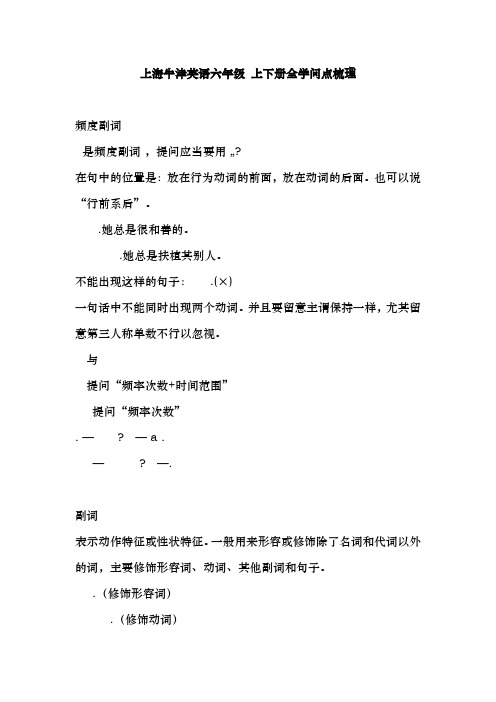
上海牛津英语六年级上下册全学问点梳理频度副词是频度副词,提问应当要用…?在句中的位置是:放在行为动词的前面,放在动词的后面。
也可以说“行前系后”。
.她总是很和善的。
.她总是扶植其别人。
不能出现这样的句子:.(×)一句话中不能同时出现两个动词。
并且要留意主谓保持一样,尤其留意第三人称单数不行以忽视。
与提问“频率次数+时间范围”提问“频率次数”. —? — a .—? —.副词表示动作特征或性状特征。
一般用来形容或修饰除了名词和代词以外的词,主要修饰形容词、动词、其他副词和句子。
.(修饰形容词).(修饰动词), .(修饰句子)形容词后面构成副词:—————————介词…?你和你的…还干什么?是个介词,后面接人称代词时,要用宾格的形式。
在详细的某一楼层只能用介词,并且第几层还要用序数词 , ,详细的某一天介词只能用,左边/右边的这个中间的这个假如是介词短语修饰,应当要放在后面,假如是形容词应放的中间在周末如今完成时如今完成时的构成是: +动词的过去分词。
去过,到过(表示如今已经回来)住在= /去,到….. (表示如今还没有回来). .I .…? 你去过…..吗?, I … . 是的,我已经去过了。
, I ‟t … . 不,还没有去过。
已经(多用于确定句,放于动词前)迄今,还(多用于疑问句和否认句,放于句末)刚刚(用法和位置和一样). I ’s .’s ?, I ’t ./ ……在…住/待…(时间)+一段时间,多与如今完成时连用表示动作从过去持续到如今的一段时间,并用提问。
代词用来指代一个人或事物,而用来指代一些人或事物。
定冠词定冠词的用法:a. 在球类运动前不加定冠词/ / , .b. 在乐器前必需加定冠词/ , .c. 在中,不加定冠词时辰表达方式/ 9月10日= a 2:15= 3:10= 1:30= 2:40= 30 用了后面就不能再有a a 一个半小时一小时二非常钟.分别表示上午和下午。
沪教牛津版六年级知识点归纳
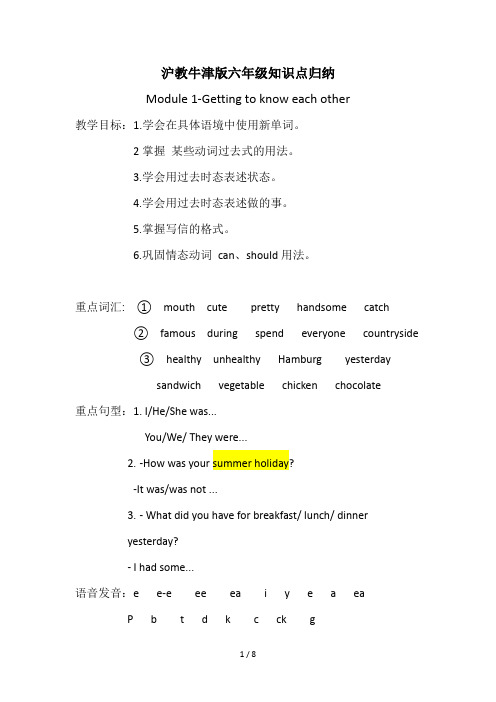
沪教牛津版六年级知识点归纳Module 1-Getting to know each other教学目标:1.学会在具体语境中使用新单词。
2掌握某些动词过去式的用法。
3.学会用过去时态表述状态。
4.学会用过去时态表述做的事。
5.掌握写信的格式。
6.巩固情态动词can、should用法。
重点词汇: ①mouth cute pretty handsome catch②famous during spend everyone countryside③healthy unhealthy Hamburg yesterdaysandwich vegetable chicken chocolate重点句型:1. I/He/She was...You/We/ They were...2.-How was your summer holiday?-It was/was not ...3.- What did you have for breakfast/ lunch/ dinneryesterday?- I had some...语音发音:e e-e ee ea i y e a eaP b t d k c ck gModule 2-Relationship教学目标:1.学会在具体语境中使用新单词。
2掌握某些动词过去式的用法。
3.学会用一般过去时的疑问句。
4.巩固wh - questions 在过去语态中的用法。
5.掌握数词hundred,thousand的用法。
6.巩固Would like to...句型和There be ...句型。
重点词汇: ①neighbour son daughter noisy dig② thousand hundred wild way die learn send③e-friend country other hobby重点句型:1. - Did you +动词原形+过去时间?- Yes,I did./ No,I didn’t.2.There was a...in the past.There were many...in the past.3.-Would you like to ...-Yes,I’d like to./No, I wouldn’t.语音发音 a ar u o ue u-e oo uf v thModule 3-Out and about教学目标:1.学会在具体语境中使用新单词。
上海牛津版六年级上Unit 1知识梳理
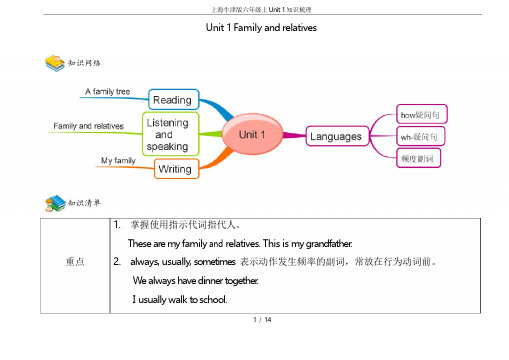
Unit1Family and relatives知识网络知识清单1.掌握使用指示代词指代人。
These are my family and relatives.This is my grandfather.重点 2.always,usually,sometimes表示动作发生频率的副词,常放在行为动词前。
W e always have dinner together.I usually walk t o school.1/14W e sometimes go swimming at the weekend.3.go shopping去购物,去买东西Alice and Betty often go shopping on Sundays.go+现在分词(v+ing)组成的词组表示“去(干……)go cycling,go swimming,go fishing1.The simple present tense一般现在时,尤其第三人称的变化和使用。
2.掌握并应用以下重点词汇及短语难点What else….?/only/family and relatives/a family tree/grandsons andgranddaughters/family members/with sb.易错点 1.一般现在时(尤其第三人称)否定及疑问的变化。
1.have的否定句和疑问句结构。
高频考点 2.always频度副词。
3.go doing表示进行某项活动。
牛津词汇2/14relative family tree granddaughter grandson only member*classmate n.亲戚;亲属家谱n.孙女;外孙女n.孙子;外孙adv.仅仅n.成员;会员n.同班同学sh o pgo shoppingelse*badmintoncyclego cyclingv.购物去购物adv.别的;其他的n.羽毛球v.骑自行车去骑自行车知识梳理第一部分:词汇精讲1.relative n.亲戚;亲属Do you have any relatives in Shanghai?你在上海有亲戚吗?【联想】family tree家谱,family member家庭成员【头脑风暴】granddaughter n.孙女;外孙女gr eat-granddaughter n.曾孙女;曾外孙女grandson n.孙子;外孙gr eat-grandson n.曾孙子;曾外孙grandfather n.祖父;外祖父grandmother n.祖母;外祖母3/14uncle n.叔叔,舅舅,姑父,叔父aunt n.阿姨,姑姑,舅母,婶婶sister n.姐,妹brother n.兄,弟cousin n.堂/表兄弟姐妹区别relative和family区别含义:在英语国家中,family通常指自己的父母、兄弟姐妹等成员;而relative指的是除此之外与自己有血缘关系或非血缘关系的亲属。
六年级上册英语沪教牛津版知识要点

Module1Getting to know each other一、核心词汇1.表示时间名词:month一个月的时间;月份yesterday昨天2.形容词:cute可爱的pretty漂亮的handsome英俊的;帅气的famous著名的;出名的healthy健康的;有益于健康的unhealthy不健康的;损害健康的3.动词:catch逮住;捕捉spend度过pick采摘4.食物名词:hamburger汉堡包fruit水果pie馅饼pizza比萨饼cola可乐sandwich三明治vegetable蔬菜chicken鸡肉chocolate巧克力5.表示动物名词:turtle乌龟fly苍蝇6.其他:during在……期间everyone每个人;所有人countryside乡村;农村7.核心词组:grow up长大;成长junior high school初级中学(be)born出生summer holiday暑假the Great Wall长城the Palace Museum故宫博物院Tian’an men Square天安门广场go swimming去游泳go to the museum去博物馆go to the cinema去电影院junior high school初级中学do my homework做我的家庭作业watch TV看电视visit my friends拜访我的朋友a little少量的fish and chips炸鱼薯条二、了解词汇1.一些动词及过去式:go(去)—went do(做)—didhave/has(有)—had watch(观看)—watchedvisit(访问;探望)—visited am/is(是)—was are(是)—were2.一些食物名词:egg鸡蛋bread面包noodles面条dumplings饺子3.其他:menu菜单三、核心句型1.Her hair was short and her eyes were big.她那时头发很短而且眼睛很大。
沪版牛津英语六年级上知识点

Module 1 Family and friendsUnit 1 Family and relatives1.family and relatives 家庭和亲戚2. a family tree 一个家谱3.grandsons and granddaughters 孙子和孙女们/外孙和外孙女们4.get a lot of presents 得到许多礼物5.Happy Birthday to sb.6.get a birthday card from sb. 从某人那儿得到一张生日卡7.one of my family members 我的家庭成员之一8.only have one aunt 仅仅有一个阿姨9.my classmates 我的同班同学10.go shopping 去购物11.what else 其他什么12.play badminton 打羽毛球13.go cycling 去骑自行车14.go swimming 去游泳15.two cousins 两个堂/表兄弟/妹16.how many + 名词复数多少……语言点1. This is my grandfather.这是我的外祖父;These are my family and relatives.这些是我的家人和亲戚;注意句中各成分保持单复数同形;2. Im their son.. 我是他们的儿子;Were their sons.我们是他们的儿子;3. How many uncles do you have你有多少个叔叔How many后面接可数名词的复数形式;4. What do you do with your…你和你的…干什么5. What else do you do with your…你和你的…还干什么6. What else do you do with your…你和你的…还干什么With是个介词,后面接人称代词时,要用宾格的形式; With me/him/her/it/us /them7. always/sometimes/usually是频度副词,提问应该要用How often…Unit 2 I have a good friend1.help each other 互相帮助2.help other people = help others 帮助别人3.not…at all 根本不4.go out at night 在晚上出去5.like to be together 喜欢在一起6.walk to school together 一起走去学校7.be friendly 友好的8.be helpful 有帮助的9.work hard = study hard 努力学习10.be late for school 上学迟到11.get angry 变得生气12.be kind to others 对别人友善的13.share sth. with sb. 和某人分享某物14.be never naughty 从不淘气15.never tell a lie/lies 从不说谎16.a visit to sp. 一次去某地的参观17.live in the USA = live in America 居住在美国18.visit sp. for the first time 第一次参观某地19.ask sb. about sth. 询问某人关于某事20.have/has been to sp. 曾去过某地21.Ocean Park 海洋公园22.Garden City Zoo 花园城市公园23.Water World 水上世界24.Friends of the Earth 地球的朋友25.look after = take care of 照顾,照看26.look after the environment 照顾环境27.all the things round us 我们周围所有的东西28.pollute the air 污染空气29.air pollution 空气污染30.water pollution 水污染nd pollution 陆地污染32.keep sth. clean 保持某物干净33.pick up 捡起,拾起34.put rubbish into rubbish bins 把垃圾放入垃圾箱35.tell sb. to do sth. 告诉某人做某事36.tell sb. not to do sth. 告诉某人不要做某事37.leave rubbish 留下垃圾38.want to be/become 想要成为39.want to do sth. 想要做某事40.promise to do sth. 承诺做某事41.promise not to do sth. 承诺不要做某事42.our promises 我们的承诺43.discuss sth. with sb. 和某人讨论某事44.reuse shopping bags 再使用购物袋45.What about/How about sth./doing… ……怎么样语言点:1.always/sometimes/usually/never 是频度副词.在句中的位置是:放在行为动词的前面,放在be动词的后面;也可以说“行前系后”; She is always kind.她总是很善良的;She always helps other people.她总是帮助其他人;不能出现这样的句子:She is always helps other people.×一句话中不能同时出现两个动词;并且要注意主谓保持一致,尤其注意第三人称单数不可以忽略;2.They like to be together.他们喜欢在一起;like to do sth.=like doing sth.喜欢做某事He likes to play football.=He likes playing football.他喜欢踢足球;3.She cant read or write.她既不会读也不会写;or用在否定句中表平列关系;and用在肯定句中表平列关系;She can read and write.她既会读又会写;4. help each other互相帮助5. other people=others其他人6. be kind to sb.对某人很友好7. tell a lie = tell lies说谎8. share sth. with sb.和某人分享某物She shares her bread with me .她把她的面包分给了我;9. in the USA在美国USA要大写;10. for the first time第一次11. on Saturday具体的某一天介词用on12. Have you been to …..yet你去过…..吗Yes, I have already/just been to…./been there.是的,我已经去过了;No, I havent been to …/been there yet.不,还没有去过;already/just用于肯定句中;yet用于否定和疑问句中;Unit 3 Spending a day out together1.spend a day out together 一起在外度过一天2.on Green Island 在绿岛上3.in Happy Town 在快乐城4.in Dragon Bay 在龙湾5.on Lucky Island 在幸运岛上6.at weekends = at the weekend 在周末7.be near sp. 离开某地近的8.be far away from sp 离开某地远的9.Seaside Town 海边镇10.a photo of my family and me 一张我家人和我的照片11.have lunch together 一起吃午饭12.Green Market 格林市场13.In Sunny Town 在太阳城14.Space Museum 太空博物馆15.In Moon Town 在月亮城16.an activity 一项活动17.have a barbecue 进行一次烧烤18.fly kites 放风筝19.ride bicycles 骑自行车20.make sandcastles 筑沙堡21.collect shells 收集贝壳22.make an album 制作一本照片簿23.plan to do sth. 计划做某事24.a good idea 一个好主意25.which place 哪一个地方26.plan a trip 计划一次旅行27.How about… ……怎么样常用于表示建议或提议28.be going to + v. 打算做…语言点:1. at weekends= at the weekend在周末2. near/ far away from离….近/远near后直接接地点名词3. Where have you been in….你去了….哪个地方I have been to….in /on… 我去了….Where have you been in Shanghai你到过上海哪里I have been to Century Park in Shanghai.我到过上海的世纪公园;photo of my brother and me 一张我哥和我的照片;a photo of后接人称代词时,应该用宾格形式a photo of me/him/her/it/us /them7. be +V-ing 表现在进行时8. cost以物作主语,通常是问价钱Take以it作主语;通常是花费时间It takes me 15 minutes to go to school.Spend 以人作主语,既可以是花费金钱,也可以是花费时间;Spend time/money on sth. spend time/money in doing sth. I spend two yuan on this pen.=I spend two yuan in buying this pen.place shall we visit我们将参加哪个地方are we going to come back我们将什么时候回来Come back回来Be going to 表将来begoing to=will 11. How are we going to get there我们将怎样到达哪里How对交通工具进行提问;回答可以用by bus/ car…/ on foot 12. How much does it cost它花费多少钱How much对价钱提问13. How about = what about怎么样14. ./.分别表示上午和下午;Module 2 Places and activitiesUnit 4 What would you like to be1.different jobs 不同的职业2.would like to be/become 想要成为……3. a secretary 一名秘书4. a bank clerk 一个银行职员5. a policewoman 一个女警察6. a dentist 一名牙医7. a pilot 一名飞行员8. a fireman 一个消防队员9. a postman 一名邮递员10.a shop assistant 一个商店营业员11.teach children English 教孩子们英语12.make sick people better 使病人好转13.drive a bus 驾驶一辆公交车14.put out fires 扑灭火15.cook food for people 为人们烧食物16.make our city a safe place 使我们的城市成为一个安全的地方17.interview sb. 采访某人18.find out 查明;弄清情况19.stark work 开始工作20.finish work 结束工作21.in the morning/afternoon/evening 在早上/下午/晚上22.Why not 为什么不呢语言点:1. would like to do sth.想要做某事2.Would you like to be a/an…你想要成为一个….Yes, I would./No, I wouldnt.是的,我想;/不,我不想;3. Why / Why not为什么/为什么不I would like to be a/an….because…..我想成为….,因为….I would like fried eggs for dinner tonight.我晚饭想要吃炒蛋;I fried eggs yesterday.我昨天炒了蛋;4.Would you like rice or noodles for dinner tonight你晚饭是想吃饭还是吃面条or在这里是标示一种选择关系;kind of soup/fruit would you like你想要哪种汤/水果would also like some soup.=I would like some soup, too.also,too两个都可以表示“也”, also用在句中,但是too用在句尾,并且要用逗号隔开; to do sth.需要做某事;We need to buy some food first.我们需要先买一些食物;list 购物单;Shopping动词的ing形式在句中充当定语;=like best最喜欢的s have tomato.让我们有西红柿;Let后面接动词原形;the market / in the supermarket在市场/在超市12. at the fish/fruit/meat …stall在鱼/水果/肉……摊位13. in the fish/fruit/meat…section在鱼/水果/肉……部门in the market,at the fish/fruit/meat …stallin the supermarket,in the fish/fruit/meat…section:Have you bought any garlic 你买了一些大蒜吗B: Yes, I have bought some garlic./ Yes, I have.是的,我买了些大蒜;这是个现在完成时,bought是buy的过去分词.现在完成时的构成是:have/has +动词的过去分词;它的回答应该用have/has; Has she bought some oranges Yes, she has. much was it=How much did it cost= What was the price of it 它多少钱; Price是“价格”的意思;did you buy it/them in the supermarket in the … sectionUnit 5 Open Day1.an Open Day 一个开放日2.Open day programme 开放日活动安排3.an entrance 一个入口处4.listen to a choir 听一个合唱队唱歌5. a noticeboard 一块布告栏6.my parents 我的父母亲7.meet sb. at the entrance 在入口处迎接某人8.arrive in + 大地方到达一个大地方9.arrive at + 小地方到达一个小地方10.visit the classroom 参观教室11.First, … /Next, … /Then, …/ After that, …/ Finally, …首先,紧接着,然后,在那以后,最后12.look at our class projects 看一看我们的班级习作项目13.in the Arts and Crafts room 在美术劳技室14.in the hall 在大厅里15.our English Club 我们的英语俱乐部16.have tea and cakes 喝茶吃蛋糕17.in the Music room 在音乐室18.welcome the parents on the Open Day 在开放日欢迎父母19.in different places 在不同的地方20.on the ground floor 在第一层英式表达法21.write an invitation 写一封邀请函22.take some photos 拍一些照片23.have a great/good time 过得愉快知识点at / arrive in / reach / get to 到达arrive at后接小地方arrive in 后接大地方I arrive at school at 7:15.He will arrive in Shanghai at two oclock.reach是个及物动词,后面直接接地点名词I reach school at 7:15.I get to school at 7:15./ be going to都是用来表将来的, 他们后面应该接动词的原形;will是个情态动词,没有人称的变化.He will arrive in Shanghai at two oclock.I will meet them at the entrance.Your parents will arrive at two oclock.但是be going to有人称的变化.He is going to go fishing tomorrow. I am going to go fishing tomorrow. They are going to go fishing tomorrow.at 看;see 看见;listen to 听;hear 听见the entrance 在入口处enter 进入动词in the hall/in the Music room /in classroom6A/in the Arts and Crafts room5.具体的某一天介词只能用onOn Sunday, On Sunday morning,On the Open Day6.在具体的某一楼层只能用介词on,并且第几层还要用序数词On the ground floor, on the first floor, on the fifteenth floor7. want sb. to do sth. = would like to do sth.想要做某事I want you to read English everyday.我想要你们每天都读英语;n the same place / in different places9. First,…/Next,…/Then…/After that,…/Finally,…Finally=at last =in the end10. take photos拍照11. invite 邀请动词invitation邀请名词Invite sb to sp邀请某人去某地She invites me to her birthday party.她邀请我去她的生日晚会;12. on the tenth of September / on September tenth 9月10日13. two fifteen= a quarter past two 2:15Three ten = ten past three3:10 One thirty = half past one1:30 two forty = twenty to three 2:4014. have a great / good time 玩得开心,过的愉快15.Parent = father or mother parents = father and motheUnit 6 Going to school1.traveling time to school 去学校行走时间2.it takes sb. some time to do sth. 某人花一段时间做某事3.It takes him about ten minutes. 他花大约十分钟;4.half an hour 半小时5.go to sp. by ferry 乘渡船去某地6.go to school on foot=walk to school 步行去学校7.how long 多久8.get to sp. 到达某地9.get to the supermarket 到达超市10.get there/here/home 到达那儿/这儿/家里11.a restaurant 一个饭店12.a hotel 一个旅馆13.an advertisement board 一块广告牌14.a few + . 几个;一些后跟可数名词复数15.a lot of + . & . 许多后跟可数名词复数或不可数名词16.on one’s way to school 在某人去某地的路上17.on my way to school 在我去学校的路上18.by light rail 乘轻轨19.department stores 百货商店20.go to kindergarten 上幼儿园语言点1. near 离很近后面直接接地点I live near school.=My home is near school.我家离学校很近;2. far away from=far from离很远He lives far away from school.=His home is far from school.他家离学校很远3. by bus/bike/car/underground/train/ferry其他的交通工具都能用take来表示乘,但bike只能用ride take a bus/bike/car/underground/train/ferry ride a bikeHe goes to school by bus.=He takes a bus to school.He goes to school by bike.=He rides his/a bike to school.=He cycles to school.4. on footShe goes to work on foot every day.=She walks to work every day.5. It takes sb. some time to do sth. 花费某人多少时间做某事;It takes me about fifteen minutes to go to school.我去学校要花费15分钟;6. half an hour=30 minutes 用了half an hour后面就不能再有minutes;7. travelling time to school 去学校的旅途时间8. How long does it take you to get to…它花费你多长时间到达9. get to “到达”表示“到达那里”只能说get there10. on ones way to …在某人去某地的路上On my way to school 在我去学校的路上/ a lot of 既可修饰可数名词又可以修饰不可数名词;当与可数名词连用时,只能与可数名词的复数形式连用12. a few 只能修饰可数名词,与可数名词的复数形式连用 a little 只能修饰不可数名词the bus 在公共汽车上on the underground 在地铁上I see a lot of trees when I am on the bus. 在公共汽车上的时候,我看见了许多树;When在本句中作连词,意为“当的时候”14. one and a half hours=one hour and a half一个半小时One hour and twenty minutes一小时二十分钟Unit 7 Rules round us1.rules and signs 规则和标记2.have rules in the classroom 在教室里有规则3.have rules on the road 在马路上有规则4.must do 必须做5.must keep quiet 必须保持安静6.must not do sth.= mustn’t do sth. 不准;禁止做7.mustn’t eat or drink 不准吃或喝8.wait for 等候9.walk on the grass 走在草地上10.listen to the teachers 听老师11.run across the road 跑过马路12.pick the flowers 摘花13.enter the centre 进入中心14.climb the trees 爬树15.talk loudly 大声交谈16.turn left/right 向左/右转17.a lift 一部电梯18.an escalator 一部自动扶梯19.on the left 在左边20.on the right 在右边21.the one on the left/right 在左边的/右边的一个22.the one in the middle 在中间的一个23.go upstairs 上楼24.go downstairs 下楼25.an exit 一个出口26.chase each other 互相追逐27.keep class rules 遵守班级规则28.break class rules 违反班级规则语言点1.in the library/in the classroom/in the parkon the road在路上2.We must not walk on the grass.我们不可以踩在草上;We must keep quiet.我们必须保持安静;must 意为“必须”表示很重要或必要; must not意为“不准”,表示不允许或禁止must是个情态动词,后面接动词原形;the road 穿过马路 4. wait for 等待mustnt eat or drink. or用于否定句中表示“并列”;and用于肯定句中表示“并列”;t talk loudly.=We mustnt talk loudly.Dont不得,不要;该句为祈使句的否定形式; Dont后面接动词原形; talk loudly 副词修饰动词does this sign mean这个标志意味着什么What does this sign mean=what is the meaning of this signcan we find it我们在哪里能找到它door must we use我们必须要使用哪一扇门情态动词的一般疑问句就是把情态动词提前,后面照抄;句号改为问号;Must we wait for the green manone on the left/right 左边/右边的这个the one in the middle 中间的这个如果是介词短语修饰the one,应该要放在the one后面,如果是形容词应放the one的中间the left/right one the middle onelate for school 迟到out查出,弄清to sb. 对某人说,跟某人交谈;talk about sb./sth.谈论关于某人/某事;15. tell sb. to do sth.告诉某人去做某事tell sb. not to do sth. 告诉某人不要做某事It tells us to keep quiet.它告诉我们要保持安静;It tells us not to talk loundly. 它告诉我们不要大声说话;Module 3 Food and DrinkUnit 8 The food we eat1.dinner menu 晚餐菜单2.cabbage soup 卷心菜汤3.chicken soup 鸡汤4.fried cabbage 炒卷心菜5.steamed prawns with garlic 蒜蓉蒸虾6.steamed fish 清蒸鱼7.fried eggs with bacon 熏肉炒蛋8.fried chicken wings 炸鸡翅9.boiled eggs 水煮蛋10.baked potato 烤土豆11.tomato and egg soup 番茄蛋汤12.after dinner 晚餐后13.What kind of… 什么种类的;;;14.need to do sth. 需要做某事15.would like noodles for dinner 晚餐想吃面条16.like seafood 喜欢海鲜17.in the market 在市场18.in the supermarket 在超市19.at the fish stall 在鱼摊20.in the fruit section 在水果部门21.frozen food 冰冻食物22.like to eat dumplings 喜欢吃饺子23.a packet of 一包/袋24.two hamburgers 两个汉堡包25.fruit salad 水果色拉语言点1. for breakfast/lunch/supper/dinnerWhat would you like for dinner tonight今天晚饭你们想吃什么for在这里表目的,用途=would d是would的缩写形式;would like sth.=want sth.想要某物would like to do sth.=would love to do sth.=want to do sth.想要做某事like sth.喜欢某物like to do sth./like doing sth.喜欢做某事I would like some apples.我想要一些苹果;I like apples.我喜欢苹果;I would like to swim after school.放学后我想去游泳;I like swimming.=I like to swim.我喜欢游泳;eggs with meat肉炖蛋baked potato烤土豆boiled eggs水煮蛋fried eggs炒蛋在这里steamed/ baked /boiled /fried都是动词的过去分词形式,在句中做定语;相当于形容词的用法;I would like fried eggs for dinner tonight.我晚饭想要吃炒蛋;I fried eggs yesterday.我昨天炒了蛋;3.Would you like rice or noodles for dinner tonight你晚饭是想吃饭还是吃面条or在这里是标示一种选择关系;kind of soup/fruit would you like你想要哪种汤/水果would also like some soup.=I would like some soup, too.also,too两个都可以表示“也”, also用在句中,但是too用在句尾,并且要用逗号隔开; to do sth.需要做某事;We need to buy some food first.我们需要先买一些食物;list 购物单;Shopping动词的ing形式在句中充当定语;=like best最喜欢的s have tomato.让我们有西红柿; Let后面接动词原形;the market / in the supermarket在市场/在超市12. at the fish/fruit/meat …stall在鱼/水果/肉摊位13. in the fish/fruit/meat…section在鱼/水果/肉部门in the market,at the fish/fruit/meat …stallin the supermarket,in the fish/fruit/meatsection:Have you bought any garlic 你买了一些大蒜吗B: Yes, I have bought some garlic./ Yes, I have.是的,我买了些大蒜;这是个现在完成时,bought是buy的过去分词.现在完成时的构成是:have/has +动词的过去分词;它的回答应该用have/has; Has she bought some oranges Yes, she has.much was it=How much did it cost= What was the price of it 它多少钱;Price是“价格”的意思;Unit 9 Picnics are fun1.plan a picnic 计划一次野餐2.have a picnic 进行一次野餐3.Picnics are fun. 野餐时有趣的事4.some cola 一些可乐5.spicy sausages 辣香肠6. a packet of nuts 一袋坚果7.lemon tea 柠檬茶8.Shall we… / Let’s… 让我们;;;,好吗9.taste nice with jam 加了果酱尝起来美味的10.buy some snacks 买一些点心11.sweet cakes 甜的蛋糕12.salty nuts 咸的坚果13.spicy chillies 辛辣的辣椒14.sour lemons 酸的柠檬15.bitter coffee 苦的咖啡16.spread some jam on the bread 在面包上抹上一些果酱17.prepare for a picnic为一次野餐做准备18.have got enough money 有足够的钱19.May I have some…, please 我可以吃些;;;吗20.Would you like some… 你想要些;;;吗Unit 101.healthy eating 健康的饮食2.good diets and bad diets 好的食谱和不好的食谱3. a food pyramid 一个食物金字塔4.need a little fat, salt and sugar 需要一点脂肪,盐和糖5.some yogurt 一些酸奶6.plenty of 大量的,充足的7.fresh fruit and vegetables 新鲜的水果和蔬菜8.be unhealthy 不健康的9.have an unhealthy diet 有不健康的食谱10.do no exercise 不做运动11.be fit and healthy 健康的12.live in the countryside 住在乡村13.stay with sb. 和某人呆在一起14.become fit and healthy 变得健康的15.have some porridge for breakfast 早餐吃些粥16.be healthier than 比;;;健康17.be less health than 不如;;;健康18.be as healthy as 像;;;一样健康19.be as unhealthy as 像;;;一样不健康20.as… as 像;;;一样;如同21.one…the other 一个;;;另一个22.good eating habits 良好的饮食习惯23.do a quiz 做一个小测试24.should do sth. 应该做某事25.should not do sth. = shouldn’t do sth. 不应该做某事26.some suggestions for good eating habits 良好的饮食习惯的一些建议知识点:1. Shall we have a picnic tomorrow=Lets have a picnic tomorrow.明天我们野餐怎么样/我们明天去野餐吧Shall we…/Lets用于提出建议;Shall是个情态动词,后面接动词原形;Lets…后面也是接动词原形;2. Thats a good idea.那是个不错的主意;3. ------Would you like some snacks-------No, thanks. I dont want any . I want some fruit.Some用在肯定句中,any用于否定和疑问句中;Would you like some snacks用some是希望得到对方肯定的回答;5.a bottle of jam一瓶果酱;Jam不可数名词;6. a packet of nuts一袋坚果a bag of ice一袋冰7. Why do you like…你为什么喜欢……I like…because…我喜欢……是因为……用Why提问时,回答时应该用because,反之亦然;8..tasty=delicious=yummy美味的,可口的;9 like ---dislike 一对反义词dislike=dont like10 Lets buy some jam to spread on the bread.让我们买些果酱,把它涂在面包上;to 在这里表目的,用途;:May I have some…,pleaseB: Ok. Here you are./Sorry. I havent got any. May I…用于提出请求;回答时,表示允许,常用Ok;/Sure./All right./Yes, you may.表示拒绝时,常用No, you may not./ Im afraid you cant. 并且may not不能用缩写的形式;:Would you like some…B: Yes, please./No, thanks.接受别人的请求时,应说Yes, please.;拒绝别人时,应说No, thanks.13. I dont want any … because its/theyre too sweet/salty/spicy/sour/bitterUnit 10 Healthy eating单词和短语healthy eating 健康的饮食need a little fat, salt and sugar 需要一点脂肪,盐和糖some yogurt 一些酸奶plenty of 大量的,充足的fresh fruit and vegetables 新鲜的水果和蔬菜a lot of rice, noodles and bread 很多米饭,面条和面包every day 每一天a lot of/ plenty of/ some/ a little 很多/大量的/一些/一些chips 薯条hamburger 汉堡包biscuits 饼干pizza 比萨ice cream 冰淇淋porridge 粥lemon tea 柠檬茶have a little tea 喝点茶be healthier than…比;;;更健康be less healthy than …比;;;相比,不太健康as healthy as …和;;;一样健康steamed chicken 蒸鸡steamed fish 蒸鱼a lot of boiled vegetables 很多水煮蔬菜be unhealthy 不健康as unhealthy as …和;;;一样不健康知识点:1.It shows us how much of each kind of food we need every day.它显示了我们每天需要多少种各种食物;2. show sb. sth.=show sth. to sb.向某人展示某物He shows his new photo to me.=He shows me his new photo.他把他的新照片给我看了;2.We need a little fat, salt and sugar. 我们需要一点脂肪、盐和糖;need sth.需要某物4. a little 修饰不可数名词some/plenty of /a lot of 既可修饰可数名词也可以修饰不可数名词; 5. a lot of >plenty of >some6. How much ...do we need 我们需要多少... ...7. He had an unhealthy diet and did no exercise.他有个不健康的饮食,并且不做运动; Exercise不可数名词;8. fit=healthyhealthy----unhealthy一对反义词health 名词健康healthy----unhealthy形容词9. have breakfast/lunch/supper/dinner吃早饭/午饭/晚饭10. What do you usually have for breakfast/lunch/dinner你通常早饭/午饭/晚饭吃什么11. healthier than 比---- 健康less healthy than 比----不健康as healthy as 像---- 一样的健康as unhealthy as像---- 一样的不健康than用于比较级中as... as用于原级比较Unit 11 Let’s make a pizza单词和短语make a pizza 做一个比萨饼funny pizza 有趣的比萨饼looks very interesting 看起来非常有趣make one more 再做一个look at the ingredients first 先看看原料a few slices of ham 几片火腿three sausages 三只香肠two green peppers 三只青椒two tomatoes 两个西红柿a piece of bread 一片面包a small tin of tomato sauce 一小罐西红柿酱a few cherries 一些樱桃Firstly/ Secondly/ Next/ Then /After that/ Finally 首先/第二/接着/然后/在那之后/最后a thick piece of bread 一片猴面包as a base 做底put some tomato sauce on it 在上面放一些番茄酱in the middle 在中间on the right of cherry 在樱桃的右边another slice of sausage 另一片香肠on the left 在左边put a slice of green pepper above each slice of sausage放一片青椒在每片香肠上面put a slice of tomato below the cherry 放一片西红柿在樱桃下面on both sides of the bread 在面包的两边put the pizza in a hot oven 把比萨放在一个热烤箱里bake it for 5 minutes 烤十分钟pastry 面团cheese 奶酪strawberry 草莓onion 洋葱pineapple菠萝sweetcorn 甜玉米beef 牛肉cherry 樱桃other ingredients 其它的作料The Wangs 王先生一家人order food and drink 点食物和饮料知识点:would you like to have as the base of your pizza I would like…would you like on your pizza I would like … on my pizza.is …这是;;;3.Shall we make one more 我们再做一个, Secondly, Next, Then, After that, Finallyslice of /slices of; a tin of/ tins of; a bag of/ bags of; a piece of/ pieces of Wangs are going to American Pizza/ Italian Pizza/ French Pizza. the + 姓氏的复数,可以表示一家人;be going to do sth 将要做某事。
上海牛津英语六年级(预初)英语知识点整理(一)
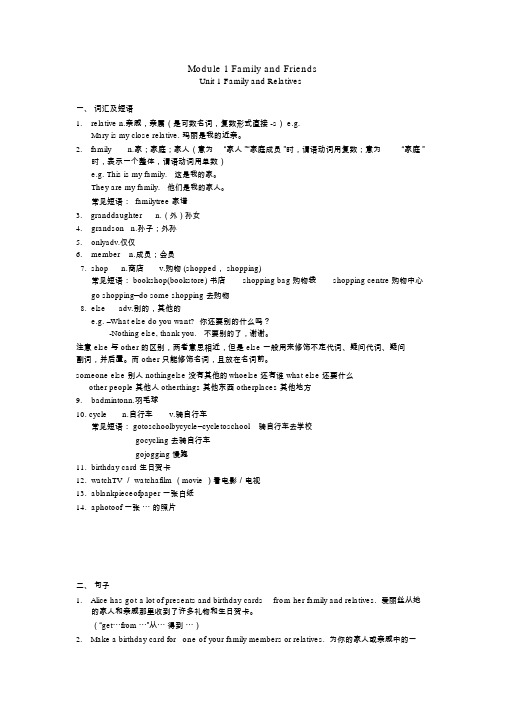
Module 1 Family and FriendsUnit 1 Family and Relatives一、词汇及短语1.relative n.亲戚,亲属(是可数名词,复数形式直接 -s) e.g.Mary is my close relative. 玛丽是我的近亲。
2. family n.家;家庭;家人(意为“家人”“家庭成员”时,谓语动词用复数;意为“家庭”时,表示一个整体,谓语动词用单数)e.g. This is my family.这是我的家。
They are my family.他们是我的家人。
常见短语: familytree 家谱3. granddaughter n.(外)孙女4.grandson n.孙子;外孙5.only adv.仅仅6.member n.成员;会员7.shop n.商店v.购物 (shopped, shopping)常见短语: bookshop(bookstore) 书店shopping bag 购物袋shopping centre 购物中心go shopping=do some shopping 去购物8.else adv.别的,其他的e.g. –What else do you want? 你还要别的什么吗?-Nothing else, thank you.不要别的了,谢谢。
注意 else 与 other 的区别,两者意思相近,但是 else 一般用来修饰不定代词、疑问代词、疑问副词,并后置。
而 other 只能修饰名词,且放在名词前。
someone else 别人 nothingelse 没有其他的whoelse 还有谁 what else 还要什么other people 其他人 otherthings 其他东西 otherplaces 其他地方9.badmintonn.羽毛球10. cycle n.自行车v.骑自行车常见短语: gotoschoolbycycle=cycletoschool骑自行车去学校gocycling 去骑自行车gojogging 慢跑11.birthday card 生日贺卡12.watchTV / watchafilm (movie )看电影/电视13.ablankpieceofpaper 一张白纸14.aphotoof 一张⋯的照片二、句子1. Alice has got a lot of presents and birthday cards from her family and relatives.爱丽丝从她的家人和亲戚那里收到了许多礼物和生日贺卡。
沪版牛津英语六年级上知识点归纳总结
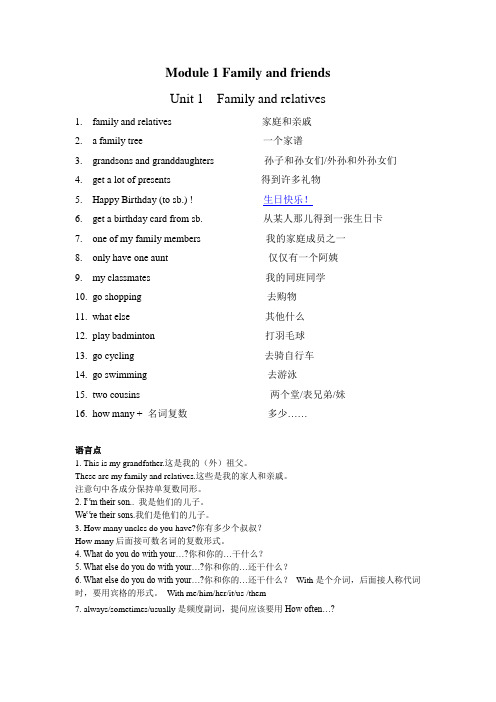
Module 1 Family and friendsUnit 1 Family and relatives1.family and relatives 家庭和亲戚2. a family tree 一个家谱3.grandsons and granddaughters 孙子和孙女们/外孙和外孙女们4.get a lot of presents 得到许多礼物5.Happy Birthday (to sb.) ! 生日快乐!6.get a birthday card from sb. 从某人那儿得到一张生日卡7.one of my family members 我的家庭成员之一8.only have one aunt 仅仅有一个阿姨9.my classmates 我的同班同学10.go shopping 去购物11.what else 其他什么12.play badminton 打羽毛球13.go cycling 去骑自行车14.go swimming 去游泳15.two cousins 两个堂/表兄弟/妹16.how many + 名词复数多少……语言点1. This is my grandfather.这是我的(外)祖父。
These are my family and relatives.这些是我的家人和亲戚。
注意句中各成分保持单复数同形。
2. I‟m their son.. 我是他们的儿子。
We‟re their sons.我们是他们的儿子。
3. How many uncles do you have?你有多少个叔叔?How many后面接可数名词的复数形式。
4. What do you do with your…?你和你的…干什么?5. What else do you do with your…?你和你的…还干什么?6. What else do you do with your…?你和你的…还干什么?With是个介词,后面接人称代词时,要用宾格的形式。
- 1、下载文档前请自行甄别文档内容的完整性,平台不提供额外的编辑、内容补充、找答案等附加服务。
- 2、"仅部分预览"的文档,不可在线预览部分如存在完整性等问题,可反馈申请退款(可完整预览的文档不适用该条件!)。
- 3、如文档侵犯您的权益,请联系客服反馈,我们会尽快为您处理(人工客服工作时间:9:00-18:30)。
Module 1
Unit 1
一、词汇及短语
1.relative n.亲戚,亲属(是可数名词,复数形式直接—s)
e.g. Mary is my close relative。
玛丽是我的近亲.
2.family n.家;家庭;家人(意为“家人”“家庭成员”时,谓语动词用复数;意为“家
庭"时,表示一个整体,谓语动词用单数)
e.g. This is my family。
这是我的家。
They are my family. 他们是我的家人.
常见短语:family tree家谱
3.granddaughter n。
(外)孙女
4.grandson n.孙子;外孙
5.only adv。
仅仅
6.member n。
成员;会员
7.shop n。
商店 v.购物(shopped,shopping)
常见短语:bookshop(bookstore)书店 shopping bag购物袋 shopping centre购物中心
go shopping=do some shopping去购物
8.else adv。
别的,其他的
e.g. –What else do you want?你还要别的什么吗?
-Nothing else, thank you。
不要别的了,谢谢.
注意else与other的区别,两者意思相近,但是else一般用来修饰不定代词、疑问代词、疑问副词,并后置。
而other只能修饰名词,且放在名词前.
someone else别人 nothing else 没有其他的 who else还有谁 what else还要什么
other people其他人 other things其他东西 other places其他地方
9.badminton n。
羽毛球
10.cycle n.自行车 v.骑自行车
常见短语:go to school by cycle=cycle to school骑自行车去学校
go cycling去骑自行车
go jogging慢跑
11.birthday card生日贺卡
12.watch TV/watch a film(movie)看电影/电视
13.a blank piece of paper一张白纸
14.a photo of一张…的照片
二、句子
1.Alice has got a lot of presents and birthday cards from her family and relatives.
爱丽丝从她的家人和亲戚那里收到了许多礼物和生日贺卡。
(“get…from…"从…得到…)
2.Make a birthday card for one of your family members or relatives。
为你的家人
或亲戚中的一员做一张生日贺卡。
(“one of…"…其中之一)
3.I only have one aunt.我只有一个阿姨。
4.She is the only girl in her family。
她是家里唯一的女孩.
5.Only three students failed in the PE examination.只有三个同学没通过体育测试。
6.Only you can help me.只有你能帮我了.
三、语法
1.How many/much…do you have?你有多少…?
e。
g。
How many books do you have? 你有多少本书?
How much bread do you have? 你有多少面包?
2.What (else) do you do wi th…?你(还)和你的…一起做什么?
3.频度副词
always总是;永远 usually通常 often经常 sometimes有时
(1)注意频度副词在句子中的位置:
频度副词在句子中习惯上位于be动词、助动词之后,行为动词之前。
e。
g。
She is always late for school。
她上学总是迟到。
He usually goes to bed at about 12。
他通常十二点睡觉。
often可以放在句中,也可放在句尾,一般不放句首。
e.g. We have been there quite often. 我们经常到那儿去。
My grandma often goes for a walk after dinner. 我奶奶经常在晚饭后散步。
sometimes较特殊,既可以放在be动词、助动词之后,行为动词之前,也可以放在句首,还可以放在句中、句尾。
e.g. I sometimes think that it is a great mistake。
我有时想这事一个大错误。
Sometimes I help my mother in the house。
有时候我帮助妈妈做家务。
(2)对一件事发生的频率进行提问时,要用How often…?
e.g. How often do you go to the cinema? 你们多长时间看一次电影?。
